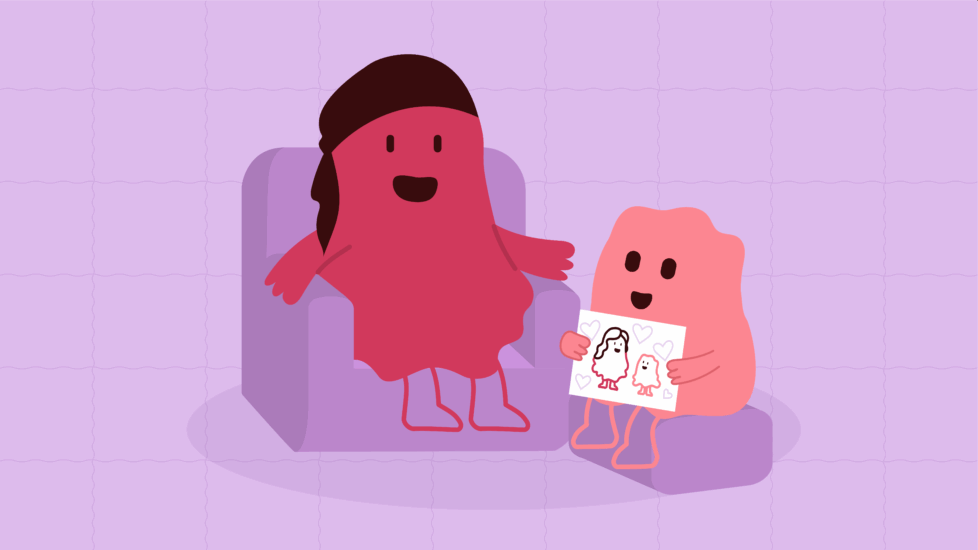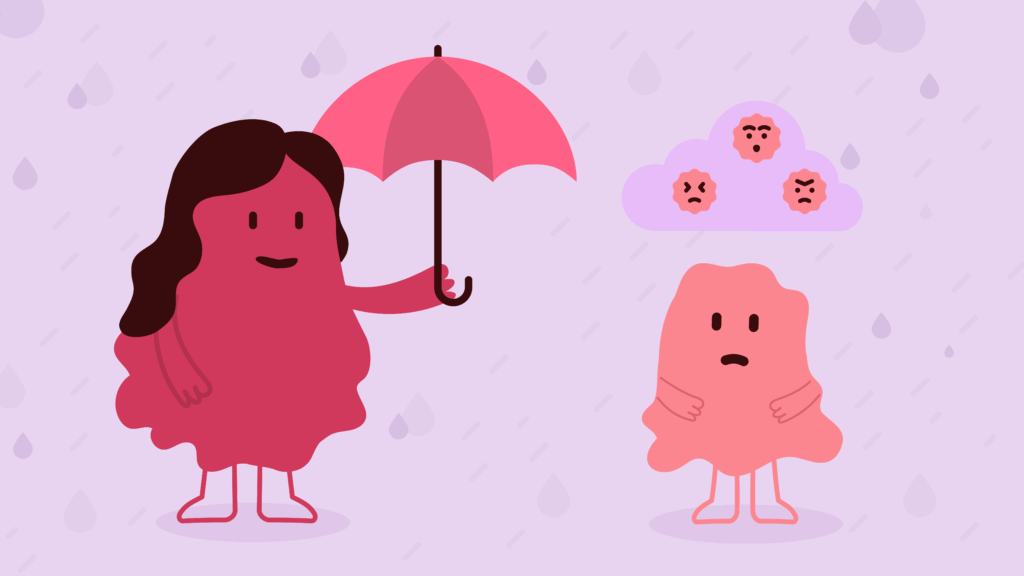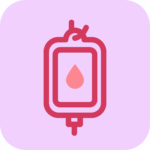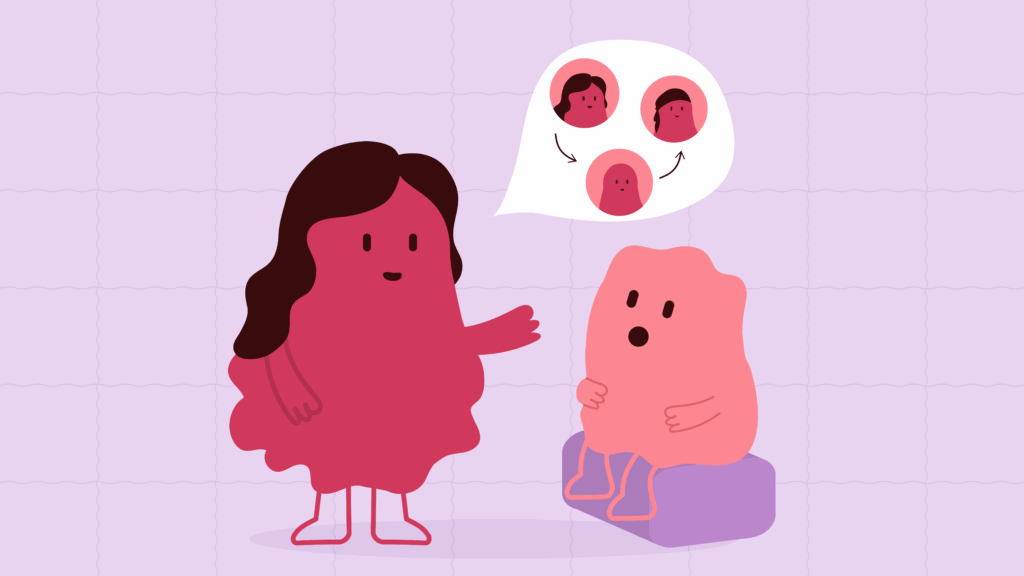


While this blog post mentions breast cancer specifically, all of the included ideas, suggestions, and prompts can be applied to all types of cancer by swapping out certain vocabulary and phrasing as needed. Additional free resources for families facing cancer can be found at nbcf.org/parents. Click here to download a printer-friendly version of this blog post.
In 2025, an estimated 16% of new breast cancer cases will be diagnosed in women younger than 50, with many of these women having children under the age of 18. It’s important for these families to have a plan in place for helping their young children process and cope with a parent’s diagnosis. One of the best things a parent diagnosed with breast cancer can do is adequately and compassionately prepare their children for the road ahead.
When you are diagnosed with breast cancer as a mother, your focus and expectations may change overnight. It’s normal to feel overwhelmed, fearful, and at a loss as you absorb the news. As you move beyond the shock of a diagnosis, you can begin to prepare yourself as well as your kids for what to expect, including what the next steps are and what you will likely experience during treatment. This guide offers tips and word-for-word prompts for preparing your children, even if you don’t have all the answers.
There is simply no easy way to say “I have cancer” to a child, but it is important to prepare them for what’s to come and how it will affect them. Being open and honest with children about what’s going on is the best way to establish and maintain a bond of trust. When kids receive open and honest communication, they are more likely to adjust and cope in healthy ways.
While it might be tempting to sugar-coat the situation for kids, it is important to share relevant details with them so that they’re not left trying to make sense of things on their own. The information you share should be tailored to your child’s age and developmental level, focusing on what they need to know, especially what they might see, experience, and how it may affect them.
By establishing a bond of trust and leading with age-appropriate honesty and transparency, your kids will know they can always come to you with their questions or worries. It shows them they are not alone in this, and they can count on you throughout this experience.
When telling your children you have cancer, be prepared for any type of reaction, or even a non-reaction. When children feel safe and comfortable, they will often show you what they need. Some children may have many questions, and others may seem relatively unfazed. It’s natural for kids to experience a range of emotions, including sadness, frustration, anxiety, anger, or even guilt. All of these reactions are normal and can vary from day to day.

Regardless of how your child reacts to the news, it is helpful and important to remind them that your diagnosis is nobody’s fault and that no matter what happens, they are loved and cared for. You can reassure them by saying something like, “This is really hard for all of us, but we’re going to trust the doctors and get through this together.”
While you don’t have to get overly technical or caught up in too much detail, it may help to explain what kind of breast cancer treatment you will receive, how often you will go to treatment, and what the potential side effects may be (see helpful prompts below). The more information you can share with your kids in an age-appropriate way ahead of time, the more prepared they will be when the things you’ve discussed start happening.
As you begin having these conversations with your kids, it’s important to keep the following in mind:
By using short, simple phrases, your kids will have a better understanding of the information and will feel more at ease in that understanding. It’s also a good idea to introduce medical terms and vocabulary your kids may often overhear, such as chemo and radiation, as simply as possible (see helpful prompts below).
Cancer is a difficult thing to understand, for adults and kids alike. As a result, kids will have an easier time understanding cancer when it’s explained in simple but real terms. For example, if it’s described as a sickness, kids may think about familiar sicknesses, which are very different from the cancer experience. In general, young children are concrete thinkers, and using metaphors may confuse them unnecessarily. Instead of metaphors, provide concrete facts and information.
Parents often want to make promises to comfort their children. However, making promises you may not be able to keep can complicate the situation.
Instead of saying, “I promise nothing will change while I have breast cancer” or “I promise I’m going to get better,” try saying, “Even though things may feel different for a little while, I’m still the same person inside” or “The doctors are going to do everything they can to help me get better.”

Depending on your child’s age and background knowledge, you may need to start at the beginning, explaining what cancer is and what it means for you and your family. Consider using the following prompts to explain the basics to your kids, adjusting for their age and developmental level.
Kids are perceptive and will pick up on changes in you as you undergo treatment for breast cancer. Consider using the following phrases to explain common breast cancer treatment terms and potential side effects to your kids so they know what to expect.

How to explain it to younger kids: “I am going to have surgery on my breast, which is this area on my chest, to get the cancer out. Surgery is when a doctor fixes something on the inside of someone’s body from the outside. I’ll probably have a big band-aid on my chest after my surgery that will take time to heal.”
How to explain it to older kids: “I am going to have a surgery called a lumpectomy/mastectomy. In this surgery, the doctor will make an opening in my body and will remove the cancer from my breast. I will be asleep during the surgery and won’t feel anything. But after surgery, I will be sore while my body heals. What questions do you have?”
Some children may want or need a more detailed explanation of the surgery, or want to know what the words “lumpectomy” or “mastectomy” actually mean. These short, concise definitions may be helpful to use:
What else you might share: Try to prepare your child for what they’ll see, experience, or notice, and how it may affect their daily life. For example, you might explain who will care for them while you’re in the hospital, and what kinds of changes might happen during your recovery.
They may need to know:
Giving them this information in advance helps reduce worry and builds trust, while letting them know what to expect and how to help.

How to explain it to younger kids: “I need to take a special kind of medicine called chemotherapy to help my cancer go away. Chemotherapy is a big word, so we can call it chemo for short. The chemo may make me feel yucky and tired for a little while, and it may even make my hair fall out. But it will grow back! I’m going to take this medicine so I can get better, even though it will make things different for a little while.”
How to explain it to older kids: “I’m going to get a kind of medicine called chemotherapy, or chemo for short. Chemo can make people feel nauseous and tired, and it might even make me lose my hair. But it will grow back! Even though chemo has some yucky side effects, I’m going to take it so I can get better.”
What else you might share: Consider helping kids understand how and why you will be taking the chemo treatments. This might include where you will go for the treatments, how long they will last, how often, and how you’ll receive them, such as through an IV, port, or pill. Also consider explaining any expected side effects so they know what to expect in advance.

How to explain it to younger kids: “I need to do something called radiation to help me get better. Radiation uses tiny, invisible waves of energy to get rid of the cancer. It might make me tired more often, and it might even look like I have a sunburn on my chest. But radiation is a treatment to get rid of the cancer cells.”
How to explain it to older kids: “I will have several treatments of something called radiation. Radiation uses invisible high-energy rays, or waves, to target and get rid of cancer cells. A machine similar to an x-ray scan targets the radiation to only the part of my body that has cancer cells, kind of like a laser beam. It may make me tired and may irritate the skin on my chest a little, but those side effects will go away when I finish the treatment.”
What else you might share: The recommended schedule for radiation is often more rigorous than chemotherapy or other treatments. Remind your kids that even though you have to go to radiation more frequently and may feel unwell for many days or weeks in a row, it is only for a temporary amount of time.
From surgical pain and drains to hair and weight loss, breast cancer treatment can have wide-ranging and intense side effects. Since your kids will likely witness these types of changes, it’s important to prepare them ahead of time so that they don’t become scared or worried. Some of the most common side effects to prepare your kids for include nausea and vomiting, fatigue, hair loss, weight loss, and changes in appetite.

Try using these example phrases to explain breast cancer treatment side effects to kids:
It’s natural for kids to be curious and have questions about what’s happening when you are in treatment for breast cancer. In these situations, it’s important to answer their questions honestly with simple, age-appropriate responses. Examples of some common questions kids ask, and suggested answers, are below.
Q: Can I catch cancer from you?
A: “No. Cancer is not contagious like a cold or the flu because it’s not caused by germs or a virus. You can’t catch cancer from me or anyone else with cancer.”
Q: Did I do something to cause you to get cancer?
A: “No. This is no one’s fault. There is nothing you or anyone else did to cause my cancer. No one really knows what causes cancer, but somewhere along the way, some of the cells in my body got damaged.”
Q: Is there something I can do to cure your cancer?
A: “No. It’s not your job to cure my cancer. The doctors and scientists work hard to find the treatments that can help my cancer. The best thing you can do is be a kid, love me through it, and I’m going to love you right back.”
Q: Who will take care of me while you’re sick?
A: “That’s a great question. We have a lot of people who can help us out. Who do you feel most comfortable with? We can talk to that person to see how they’re able to help.”
Some breast cancer patients try to establish an “inner circle” and an “outer circle” of support. The inner circle is made up of just a few people your kids know the best and feel the closest and safest with. Oftentimes, this is the patient’s spouse or partner or other close relatives, and those who help with direct child care tasks. The outer circle is everyone else, including close friends, neighbors, church members, and others you trust and your child feels comfortable and safe with. The outer circle may be relied on more for help outside of the house, like meal delivery and errands.
Q: Are you going to die?
A: This is an emotionally painful question to hear from your kids, especially if you are dealing with your own fears. It’s helpful to prepare your answer based on your current condition or situation. If your cancer is treatable, answer truthfully with a focus on hope. This may sound like: “The doctors feel like the medicines can make my cancer better. So that’s what we’re going to do. I will let you know if anything changes, but right now, I am doing what I need to do to live a long time.”
If a child persists in asking whether you can die from cancer, you help them most by telling the truth, couched in love and hope. This may sound like: “Some people die from cancer. I could possibly die from cancer, but I’m not dying now. I’m hoping to get well. I will tell you if anything changes. Today, I’m doing what I need to do to get better and live a long life. So let’s do what we can to make today great.”
Your experience with cancer and what kids already know or hear about the disease may cause them to start asking questions about death. If your child asks what it means to die, an honest answer may sound like, “Death is when the body stops working and the person cannot keep living.” An alternative may be, “Death means that the heart stopped beating and the lungs stopped breathing, which makes it impossible for the body to work anymore.”
Q: What can I do to help?
A: “That’s a very thoughtful question. I want you to focus on being a kid. But there are probably some things you could do to help me and the family. What ideas do you have? Then I’ll share some of mine.”
Potential ways kids can help during this time may include doing simple chores around the house, such as taking out the trash and keeping their room tidy. Learn more ways kids can help and feel involved in Small Hands, Big Hearts: Involving Kids in Supporting a Parent with Cancer.
Q: Is this something we should keep secret?
The answer to this question is going to largely depend on your family’s comfort level. Adjust your response as needed.
A: “Not necessarily. I feel comfortable telling some people so that they can help us when we need it. And I was thinking it might help to tell your teachers so they can also support you.”
A breast cancer diagnosis and treatment can be hard on the patient and their family. By equipping kids with the information they need and answering their questions openly and honestly, parents can help alleviate some of the anxiety and fear children often experience when a parent has breast cancer. Relieving these fears can help the entire family rest, recuperate, and heal together.
NBCF is here for parents facing cancer; you are not alone in this journey. For more free resources to help guide children through a parent’s cancer diagnosis, read:
In addition to NBCF, there are other groups dedicated to the emotional well-being of children and families who have a parent facing cancer. Below are a few organizations to consider partnering with on this journey.
American Cancer Society Facts & Figures
American Cancer Society
Dana-Farber Cancer Institute
National Cancer Institute
The Ohio State University
Pickles Group
Webinar: ABCD LEAP Speaker Series – Parenting Through Cancer, Carissa Hodgson, LCSW, OSW-C
National Breast Cancer Foundation is here for you—and your family—as you navigate a breast cancer diagnosis. Visit our website to learn about NBCF breast cancer support groups, obtain free educational resources, or find a patient navigator in your area.
Donations are always appreciated, but there are lots of great ways to get involved.